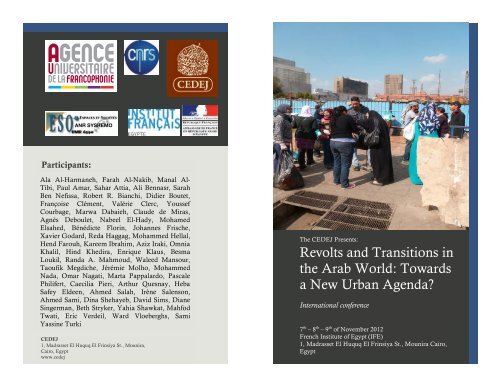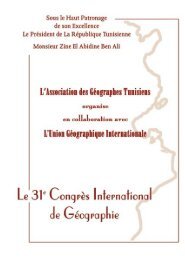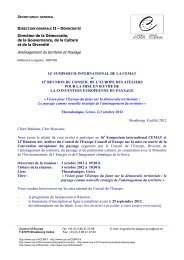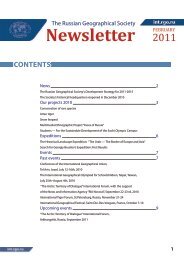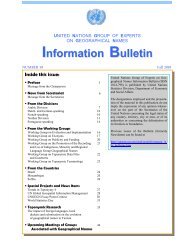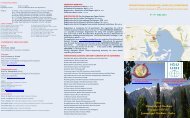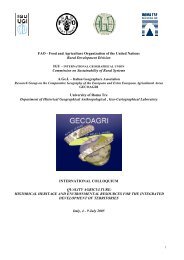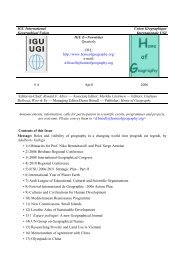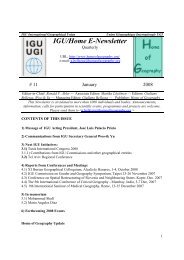Revolts and Transitions in the Arab World - Le Centre de Recherche ...
Revolts and Transitions in the Arab World - Le Centre de Recherche ...
Revolts and Transitions in the Arab World - Le Centre de Recherche ...
- No tags were found...
You also want an ePaper? Increase the reach of your titles
YUMPU automatically turns print PDFs into web optimized ePapers that Google loves.
ForewordThe 2011 popular upris<strong>in</strong>gs <strong>in</strong> <strong>the</strong> <strong>Arab</strong> world wi<strong>de</strong>ly affectedlarge <strong>and</strong> medium cities of <strong>the</strong> regions, at same time as <strong>the</strong>y<strong>de</strong>eply <strong>in</strong>volved urban societies. The elections that followed <strong>in</strong>some countries (notably Tunisia <strong>and</strong> Egypt) could have a<strong>de</strong>cisive impact on <strong>the</strong> ways of govern<strong>in</strong>g urban areas.The year 2011 put <strong>in</strong>to question urban action from <strong>the</strong> past, asit was led by collapsed or disrupted regimes, <strong>and</strong> of <strong>the</strong> future.At <strong>the</strong> beg<strong>in</strong>n<strong>in</strong>g of a necessarily long process, we still do notknow what result this “Revolution” will have. None<strong>the</strong>less, itis already possible to assert that a new urban <strong>de</strong>velopmentmo<strong>de</strong>l will present many challenges.This <strong>in</strong>ternational colloquium aims to discuss <strong>the</strong> urb<strong>and</strong>imension of <strong>the</strong> great changes <strong>in</strong> <strong>the</strong> <strong>Arab</strong> world, from <strong>the</strong>orig<strong>in</strong>s of <strong>the</strong> 2011 revolutionary episo<strong>de</strong>s to <strong>the</strong> presentexperiences of <strong>de</strong>mocratisation, along with phases of politicaltransition <strong>and</strong> socio-economic crisis <strong>in</strong> which states are stillentangled. Our objective is to (re)consi<strong>de</strong>r processes ofurbanisation <strong>and</strong> urban practices, by <strong>the</strong> yardstick of <strong>the</strong>political, economic <strong>and</strong> social issues relevant <strong>in</strong> <strong>the</strong> regions<strong>in</strong>ce <strong>the</strong> beg<strong>in</strong>n<strong>in</strong>g of <strong>the</strong> <strong>de</strong>ca<strong>de</strong>. Researchers <strong>in</strong> socialsciences <strong>and</strong> experts on Maghreb, Middle-East <strong>and</strong> <strong>Arab</strong>ianPen<strong>in</strong>sula will compare <strong>the</strong>ir different po<strong>in</strong>ts of view. Thus,this colloquium aims to contribute to <strong>the</strong> revitalization ofurban studies <strong>in</strong> <strong>the</strong> <strong>Arab</strong> world, <strong>in</strong>creas<strong>in</strong>gly more aligned toeconomic <strong>and</strong> political analysis.Five topics structure will be <strong>de</strong>bated throughout <strong>the</strong>conference:1. The urban dimensions of revolts2011 was a major <strong>and</strong> unseen break year for many <strong>Arab</strong> states.The extent <strong>and</strong> <strong>in</strong>tensity of mobilizations expressed a <strong>de</strong>sire ofradical political change. Most of <strong>the</strong>se protest movements startfrom medium <strong>and</strong> outly<strong>in</strong>g cities (Tunisia, Libya, Syria).Beyond <strong>the</strong> coercive politics led by regimes, some of <strong>the</strong>mhav<strong>in</strong>g collapsed when <strong>the</strong> o<strong>the</strong>rs are still <strong>in</strong> place, <strong>the</strong>semovements seem to reveal <strong>the</strong> unequal <strong>de</strong>velopment ofterritories, between as well as <strong>in</strong> <strong>the</strong> different cities.Do <strong>the</strong>se revolts reflect <strong>the</strong> exhaustion of <strong>de</strong>velopment mo<strong>de</strong>lsmostly based on <strong>the</strong> capture of l<strong>and</strong> rent by bus<strong>in</strong>essmen closeto <strong>the</strong> political lea<strong>de</strong>rs?Do <strong>the</strong>y reveal <strong>the</strong> frustration of populations disappo<strong>in</strong>ted by<strong>the</strong> official strategies of <strong>de</strong>velopment (economic, social,“human”, etc)? These strategies had <strong>in</strong><strong>de</strong>ed mixed results on<strong>the</strong> daily life. In <strong>the</strong> Egyptian case particularly, privatiz<strong>in</strong>g partof <strong>the</strong> urban services <strong>and</strong> public goods has been clearlyharmful.This axis will be composed of contributions study<strong>in</strong>g <strong>the</strong> urb<strong>and</strong>imensions of <strong>Arab</strong> revolutions. Thus, go<strong>in</strong>g back to <strong>the</strong> “prerevolutionary”mobilizations, concern<strong>in</strong>g issues such ashous<strong>in</strong>g <strong>and</strong> basic urban services access, notably <strong>in</strong> “<strong>in</strong>formal”areas, seems to be essential.2. Liv<strong>in</strong>g <strong>in</strong> cities <strong>in</strong> revolt <strong>and</strong> transition<strong>Revolts</strong> <strong>the</strong>mselves have been territorialized. They highlightedseveral cities that were very discrete before, on <strong>the</strong> politicalmaps of <strong>the</strong> <strong>Arab</strong> world <strong>and</strong> <strong>in</strong> <strong>the</strong> scientific literature about<strong>the</strong> region: Sidi Bouzid <strong>in</strong> Tunisia, Benghazi <strong>in</strong> Libya, Dera<strong>and</strong> Homs <strong>in</strong> Syria, Taez <strong>in</strong> Yemen, Sohar <strong>in</strong> Oman, etc.2
Central squares <strong>and</strong> emblematic places from <strong>the</strong> local urbanitywill be bear<strong>in</strong>g <strong>the</strong> stigma of <strong>the</strong>se revolts for a long time:Tahrir square <strong>in</strong> Cairo, which rema<strong>in</strong>s <strong>the</strong> active heart of <strong>the</strong>unf<strong>in</strong>ished Egyptian revolution; Change square (Taghir) <strong>in</strong>Sana’a, so-called by <strong>the</strong> protesters, few kilometers away from<strong>the</strong> Liberation square (Tahrir), occupied by Saleh’s men before<strong>the</strong> great <strong>de</strong>monstrations of February 2011; or Pearl square <strong>in</strong>Manama, <strong>de</strong>stroyed by <strong>the</strong> Bahra<strong>in</strong> army to prevent<strong>de</strong>monstrators from mak<strong>in</strong>g it <strong>the</strong> hot-spot of resistanceactivities. These places <strong>and</strong> territories hit <strong>the</strong> headl<strong>in</strong>es.Strategies to bypass, control <strong>and</strong> take over <strong>the</strong>m are worthstudy<strong>in</strong>g.The aim is also to present <strong>in</strong> situ analysis of cities <strong>in</strong> revolt<strong>and</strong>/or <strong>in</strong> transition, with contributions based on ethnographicsurveys about ways of liv<strong>in</strong>g, work<strong>in</strong>g <strong>and</strong> travell<strong>in</strong>g <strong>in</strong> suchsituations. Specific explanations will be presented about <strong>the</strong>major changes with<strong>in</strong> <strong>the</strong> framework of <strong>de</strong>creas<strong>in</strong>g politicalcontrol, weakened state, un<strong>de</strong>rm<strong>in</strong><strong>in</strong>g police authority, etc.For <strong>in</strong>stance, revolts had direct <strong>and</strong> obvious consequences onurban morphologies, even <strong>in</strong> places where no riot occurred.In some towns, property speculation has never been sodynamic. On average, three floors have been ad<strong>de</strong>d tobuild<strong>in</strong>gs <strong>in</strong> some outly<strong>in</strong>g districts of Cairo. Investors tookadvantage of <strong>the</strong> fall of Mubarak regime to get round <strong>the</strong> townplann<strong>in</strong>gregulations, mak<strong>in</strong>g no secret of it.3. Details <strong>and</strong> questions about public urban actionMany questions can be tackled here:The great urban <strong>and</strong> tourist projects <strong>in</strong>volv<strong>in</strong>g <strong>the</strong> formerpowers: did <strong>the</strong> “<strong>Arab</strong> spr<strong>in</strong>g” stop (temporarily orpermanently?) some of <strong>the</strong> urban projects negotiated between<strong>the</strong> former authoritarian powers <strong>and</strong> mult<strong>in</strong>ational firms, for<strong>in</strong>stance <strong>the</strong> Cairo 2050 Master Plan, or <strong>the</strong> tourist <strong>and</strong>commercial projects fun<strong>de</strong>d by Emirates companies <strong>in</strong> Syria, ofwhich <strong>the</strong> execution is now very uncerta<strong>in</strong>?As for <strong>the</strong> former urban <strong>and</strong> territorial governance: are <strong>the</strong>adm<strong>in</strong>istrative division <strong>and</strong> political responsibilities put <strong>in</strong>toquestion? If change is actually <strong>de</strong>m<strong>and</strong>ed, by what means(what are <strong>the</strong> new k<strong>in</strong>ds of discourses <strong>and</strong> how centralization isnow criticized?)?In <strong>the</strong> field of hous<strong>in</strong>g, are <strong>the</strong> shortcom<strong>in</strong>gs of urban policieshighlighted?How could we assess public action <strong>in</strong> that matter (new towns,<strong>in</strong>formal districts, regulations)? A <strong>de</strong>sire to break with <strong>the</strong> pastcan be seen. How is it expressed today?4. Elections <strong>and</strong> new political powers: <strong>the</strong> urban agenda <strong>in</strong>questionWhat was <strong>the</strong> urban dimension of political programmes orelectoral discourses formulated by <strong>the</strong> different parties dur<strong>in</strong>g<strong>the</strong> 2011 elections? Islamist breakthrough <strong>in</strong> Tunisia <strong>and</strong> Egyptcould be partly expla<strong>in</strong>ed by <strong>the</strong>ir long presence <strong>and</strong> action <strong>in</strong>popular districts neglected by former regimes. Will <strong>the</strong>Islamists be able to <strong>de</strong>velop punctual actions, such as newspecific services, <strong>in</strong> l<strong>in</strong>e with a global town plann<strong>in</strong>g? Who will3
e <strong>the</strong>ir <strong>in</strong>terlocutors <strong>in</strong> that matter? What role will play <strong>the</strong>o<strong>the</strong>r political forces?Will <strong>the</strong> new governments <strong>and</strong> parliamentary chambers haveto follow a new urban agenda? What are <strong>the</strong> new scopes toplace on this agenda?Discontentment from <strong>the</strong> <strong>in</strong>formal districts cannot be ignoredanymore by disrupted regimes or transitional powers. Is <strong>the</strong>reany tangible sign of change?Are we mov<strong>in</strong>g towards new adm<strong>in</strong>istrative divisions <strong>and</strong><strong>de</strong>volution to local authorities, especially to major regionalcities? In<strong>de</strong>ed hyper-centralism is characteristic of authoritariangovernments. This resulted <strong>in</strong> consi<strong>de</strong>rable confusion betweengovernorates <strong>and</strong> municipalities. However, new authoritieshave just been nationally elected <strong>and</strong> established. Will it lead tonew methods of local governance, promot<strong>in</strong>g proximity <strong>and</strong>limit<strong>in</strong>g spatial fragmentation?5. Reth<strong>in</strong>k<strong>in</strong>g susta<strong>in</strong>able urban <strong>de</strong>velopment: proposalsfrom civil society <strong>and</strong> silent partnersIn 2011, <strong>the</strong>re was also an evolution of <strong>the</strong> strategies <strong>de</strong>velopedby operators <strong>in</strong> charge of foreign aid to <strong>Arab</strong> nations. How do<strong>the</strong> multilateral <strong>and</strong> bilateral partners change <strong>the</strong>ir<strong>de</strong>velopment <strong>and</strong> f<strong>in</strong>anc<strong>in</strong>g strategy, while a new politicalgeography is tak<strong>in</strong>g shape <strong>in</strong> <strong>the</strong> region?Can we really talk about a wi<strong>de</strong>r range of possibilities for <strong>the</strong>civil society? After <strong>the</strong> outbreak of revolts,what where <strong>the</strong> structured or most visible groups? What are <strong>the</strong>new issues <strong>in</strong> <strong>de</strong>bate <strong>and</strong> projects un<strong>de</strong>r discussion? Who isbr<strong>in</strong>g<strong>in</strong>g <strong>the</strong>m?Are <strong>the</strong> associations <strong>and</strong> NGOs establish<strong>in</strong>g new priorities?Organisation:Organized by <strong>the</strong> Pole "City <strong>and</strong> Susta<strong>in</strong>able Development" of<strong>the</strong> CEDEJ (http://www.ce<strong>de</strong>j-eg.org/), this colloquium isalso part of two ongo<strong>in</strong>g research programs:- Susta<strong>in</strong>able City <strong>in</strong> <strong>the</strong> South Mediterranean (MeRsi project),co-fun<strong>de</strong>d by <strong>the</strong> Agence Universitaire <strong>de</strong> la Francophonie(Aca<strong>de</strong>mic Agency of French-speak<strong>in</strong>g countries)- Middle EastOffice <strong>and</strong> <strong>the</strong> CEDEJ;- SYSREMO: Global Geographies : Towards a regional system<strong>in</strong> <strong>the</strong> Middle East, fun<strong>de</strong>d by <strong>the</strong> Agence Nationale <strong>de</strong> la<strong>Recherche</strong> (National Agency for Research), France (ESO-Rennes).Organizers:Dr Pierre-Arnaud BARTHEL (Associate Professor <strong>in</strong>Urbanism, Université Paris-Est – LATTS-CNRS)Dr Roman STADNICKI (Head of <strong>the</strong> ‘Urbanism <strong>and</strong>Susta<strong>in</strong>able Development’ center at <strong>the</strong> CEDEJ, MAEE-CNRS Cairo)Dr <strong>Le</strong>ïla VIGNAL (Associate professor <strong>in</strong> geography; chairat <strong>the</strong> CNRS/Université Rennes-2)4
ProgramWednesday 7 thProgramWednesday 7 th09:00-10:00 – Registration10:00-11:00 – Introduction <strong>and</strong> SpeechesSpeech by H.E. Nicolas Galley, Ambassador of France (tobe confirmed)Speech by B. Rougier, director of <strong>the</strong> CEDEJIntroduction to <strong>the</strong> conference: P.-A. Bar<strong>the</strong>l (LATTS-IFU),R. Stadnicki (CEDEJ), L. Vignal (Rennes 2)11:00-13:00 – Introduction Session: The UrbanDimensions of <strong>Revolts</strong>Chair: Bernard Rougier, Director of <strong>the</strong> CEDEJYoussef Courbage – Demographic, Urban <strong>and</strong> Democratic<strong>Transitions</strong> <strong>in</strong> <strong>the</strong> <strong>Arab</strong> <strong>World</strong>Demographer, Emeritus Research Director, INED, ParisRobert Bianchi – Urban Politics <strong>in</strong> Egypt <strong>and</strong> TunisiaVisit<strong>in</strong>g Research Professor, Middle East Institute, TheNational University of S<strong>in</strong>gaporeKareem Ibrahim & Diane S<strong>in</strong>german – Urban Egypt: On<strong>the</strong> Road from <strong>the</strong> Revolution to <strong>the</strong> StateKareem Ibrahim – Architect <strong>and</strong> Urban Planner; Co-Foun<strong>de</strong>r of Takween ICDDiane S<strong>in</strong>german – Associate Professor, Department ofGovernment, School of Public Affairs, American Universityof Cairo‘<strong>Revolts</strong> <strong>and</strong> <strong>Transitions</strong> <strong>in</strong> <strong>the</strong> <strong>Arab</strong> <strong>World</strong>: Towards a New Urban Agenda?’CEDEJ – November 7-9 2012!Agnès Deboulet & Bénédicte Flor<strong>in</strong> – Pre-RevolutionaryMobilizations <strong>in</strong> Cairo: when Dwellers of PopularNeighbourhoods DemonstrateAgnès Deboulet – Professor of Sociology <strong>and</strong> Urbanism,University of Paris 8Bénédicte Flor<strong>in</strong> – Associate Professor <strong>in</strong> Geography,University of ToursAla Al-Harmaneh – Claim Your City, Claim YourCountry: Reth<strong>in</strong>k<strong>in</strong>g <strong>the</strong> Urban <strong>in</strong> <strong>the</strong> <strong>Arab</strong> <strong>Revolts</strong>Assistant Professor, Institute for Geography, University ofMa<strong>in</strong>z. Senior Researcher, Center for Research on <strong>the</strong> <strong>Arab</strong><strong>World</strong> (CERAW)13:00-14:30 – Lunch: Restaurant of <strong>the</strong> IFE14:30-16:30 – Session 1: Liv<strong>in</strong>g through Revolt<strong>and</strong> Transition: <strong>the</strong> case of EgyptChair: Mohamed Elshahed, PhD C<strong>and</strong>idate, New YorkUniversity’s Middle East Department; foun<strong>de</strong>r of <strong>the</strong> blogcairobserver.comPaul Amar – New Logics of Popular Sovereignty <strong>and</strong>Urban Subaltern Alternatives to <strong>the</strong> Egyptian ‘Thug State’Associate Professor, University of California Santa BarbaraMarwa Dabaieh – Tahrir as a Memory, a Place <strong>and</strong> aMean<strong>in</strong>gConservation Architect; Researcher, Lund University(Swe<strong>de</strong>n)5
ProgramWednesday 7 thProgramWednesday 7 thMarta Pappalardo – Revolution <strong>and</strong> Globalization: aRead<strong>in</strong>g of <strong>the</strong> Political Mobilization through UrbanStrategies <strong>in</strong> Downtown CairoPhD C<strong>and</strong>idate <strong>in</strong> Urban Sociology, University of ParisOuest Nanterre La DéfenseEnrique Klaus – Graffiti <strong>and</strong> Urban Revolt <strong>in</strong> Cairo:Artistic, Mnemonic <strong>and</strong> Protest<strong>in</strong>g Practices of <strong>the</strong> CityAssistant Professor, Sciences-Po Rabat; Post-DoctoralResearcher at <strong>Centre</strong> Jacques-BerqueBeth Stryker & Omar Nagati – Archiv<strong>in</strong>g a City <strong>in</strong> Flux:Cairo’s Evolv<strong>in</strong>g Urbanism Pre- <strong>and</strong> Post-RevolutionBeth Stryker – In<strong>de</strong>pen<strong>de</strong>nt Curator, Beirut, New York <strong>and</strong>ChicagoOmar Nagati – PhD C<strong>and</strong>idate at <strong>the</strong> Department ofArchitecture, Berkely; Visit<strong>in</strong>g Instructor at <strong>the</strong> Departmentof Architecture, Cairo University16:30-17:00 – Coffee Break17:00-19:00 – Session 2: Liv<strong>in</strong>g through Revolt<strong>and</strong> Transition: O<strong>the</strong>r Examples from <strong>the</strong><strong>Arab</strong> <strong>World</strong>Chair: Hend Farouh, Hous<strong>in</strong>g <strong>and</strong> Build<strong>in</strong>g ResearchCenter, EgyptFarah Al-Nakib – Popular Participation <strong>in</strong> Politics <strong>and</strong>Plann<strong>in</strong>g: Locat<strong>in</strong>g Kuwait Amid Upris<strong>in</strong>gs <strong>and</strong>UrbanizationsAssistant Professor, American University of Kuwait,Director of <strong>the</strong> Center for Gulf StudiesCaecilia Pieri – The Replication of ‘Green Zones’ <strong>in</strong>Baghdad: an Impossible ‘Iraqi Spr<strong>in</strong>g’Head of <strong>the</strong> Urban Observatory with<strong>in</strong> <strong>the</strong> Institut Françaisdu Proche Orient (Ifpo), BeirutWard Vloeberghs - Claim<strong>in</strong>g <strong>the</strong> Spr<strong>in</strong>g from Beirut:Exam<strong>in</strong><strong>in</strong>g <strong>the</strong> Future’s Discursive <strong>and</strong> Spatial PracticesAssistant Professor at <strong>the</strong> Ecole <strong>de</strong> Gouvernance etd’Economie <strong>de</strong> Rabat, Morocco; Deputy Director CERAMJohannes Frische – ‘Quiet Encroachment’ <strong>and</strong> EverydayResistance: Informal Politics of Urban Youth <strong>in</strong> TunisiaPhD C<strong>and</strong>idate at <strong>the</strong> Research Tra<strong>in</strong><strong>in</strong>g Group CriticalJunctures of Globalization, University of <strong>Le</strong>ipzig‘<strong>Revolts</strong> <strong>and</strong> <strong>Transitions</strong> <strong>in</strong> <strong>the</strong> <strong>Arab</strong> <strong>World</strong>: Towards a New Urban Agenda?’CEDEJ – November 7-9 20126
ProgramThursday 8 thProgramThursday 8 th09:30-11:00 – Session 3: Details <strong>and</strong> QuestionsOn Public Urban Action (Part I)Chair: Diane S<strong>in</strong>german, American University <strong>in</strong> CairoPascale Philifert – Morocco 2011/2012: Persistence ofPast Urban Policies or New Historical Sequence forUrban Action?Professor at University of Paris Ouest Nanterre La DéfenseBesma Loukil – Public Space <strong>and</strong> Policy of <strong>the</strong> ‘AncienRégime’ <strong>in</strong> TunisiaPhD C<strong>and</strong>idate <strong>in</strong> L<strong>and</strong>scape Architecture, UniversityAGROPARISTECH ENSP Versailles-Marseille <strong>and</strong> ISA/University of SousseIrène Salenson – Urban Development <strong>in</strong> Palest<strong>in</strong>e s<strong>in</strong>ce<strong>the</strong> Fayyad Era (2007-present): Tension Between Localism<strong>and</strong> GlobalizationDoctor <strong>in</strong> Geography <strong>and</strong> Urbanism; In<strong>de</strong>pen<strong>de</strong>ntResearcherAziz Iraki – The February 20 th Movement: Changes <strong>in</strong>Policy Regulation <strong>and</strong> Elites Ensur<strong>in</strong>g Intermediation <strong>in</strong><strong>the</strong> so-called ‘Unhealthy’ Neighborhoods?Professor at <strong>the</strong> Institut National d’Aménagement etd’Urbanisme11:00-11:30 – Coffee Break11:30-13:00 – Session 4: Details <strong>and</strong> QuestionsOn Public Urban Action (Part II)Chair: Agnès Deboulet, Université Paris 8Valérie Clerc – Syrian Urban Action Un<strong>de</strong>r <strong>Revolts</strong>,Evolutions <strong>and</strong> Permanence of Urban Politics <strong>in</strong>DamascusResearcher, Institut <strong>de</strong> <strong>Recherche</strong> pour le Développement;Associate Researcher Institut Français du Proche-Orient(Ifpo)Eric Ver<strong>de</strong>il – Energy, New Urban Public Question:Securization <strong>and</strong> Reorganization of Energy Provision <strong>and</strong>New Urban MobilizationResearcher, University of Lyon-CNRS, “Environment, City<strong>and</strong> Society”Xavier Godard - Urban Transport Systems: Some MajorStakes <strong>in</strong> <strong>the</strong> Context of <strong>Revolts</strong> <strong>and</strong> Transition <strong>in</strong> <strong>Arab</strong>CountriesEmeritus Research Director at <strong>the</strong> Inrets (Institut National<strong>de</strong> <strong>Recherche</strong> sur les Transports et leur Sécurité, now Ifsstar)Clau<strong>de</strong> <strong>de</strong> Miras & Aziz Iraki – <strong>Arab</strong> Spr<strong>in</strong>g, UrbanPublic Action <strong>and</strong> Intermediation <strong>in</strong> Morocco:Governance of Essential Services <strong>and</strong> Intermediation <strong>in</strong><strong>the</strong> Face of Social Movements‘<strong>Revolts</strong> <strong>and</strong> <strong>Transitions</strong> <strong>in</strong> <strong>the</strong> <strong>Arab</strong> <strong>World</strong>: Towards a New Urban Agenda?’CEDEJ – November 7-9 20127
ProgramThursday 8 thProgramThursday 8 thAziz Iraki – Professor at <strong>the</strong> Institut Nationald’Aménagement et d’Urbanisme; ArchitectClau<strong>de</strong> <strong>de</strong> Miras – Economist; Research Director at <strong>the</strong>Research Institute for Development (LPED)13:00-14:30 – Lunch: Restaurant of <strong>the</strong> IFE14:30-16:30 – Session 5: Elections <strong>and</strong> NewPolitical Powers: <strong>the</strong> Urban Agenda <strong>in</strong>QuestionChair: Youssef Courbage, INEDHeba Safey El<strong>de</strong>en - Toward a New DevelopmentalAgenda for <strong>the</strong> Urban Poor: <strong>the</strong> Case of Ezbet Harb, GizaAssociate Professor, Architecture, American University ofCairoMohammed Hellal – Urban Reactions of Local Actors of<strong>the</strong> Town of Monastir (Tunisian Sahel), <strong>in</strong> <strong>the</strong> Context of<strong>the</strong> After Revolution of January 14 th 2011Assistant Professor at <strong>the</strong> University of Carthage; PhDC<strong>and</strong>idate <strong>in</strong> Geography at <strong>the</strong> University of ToursMahfod Twati & Didier Boutet – Libya <strong>in</strong> Search of aTerritorial AgendaDidier Boutet – Researcher-Professor, University of ToursTwati Mahfod – Doctor <strong>in</strong> Public Law, University of Tours;Researcher-Professor, University of Al-Assmariyya (Libya)Ali Bennasr – Tunisia: <strong>the</strong> City <strong>and</strong> <strong>the</strong> ElectionsProfessor of Geography, Sfax University (Tunisia)16:30-17:00 – Coffee Break17:00-19:00 – Forum 1: Cairo <strong>in</strong> MovementsChair: David Sims – <strong>in</strong><strong>de</strong>pen<strong>de</strong>nt consultantSahar Attia - The Vision <strong>and</strong> Strategy of Greater CairoRegion: post Revolution ConcernsProfessor of Architecture & Urban Design, Cairo UniversityR<strong>and</strong>a A. Mahmoud & Ahmed Sami - From Cairo 2050 toEgypt 2052: Develop<strong>in</strong>g Greater Cairo Region or Mov<strong>in</strong>gAway from It?Assistant Professors at <strong>the</strong> Dept. of Plann<strong>in</strong>g & UrbanDesign of A<strong>in</strong> Shams University (Cairo)Omar Nagati - M<strong>in</strong>d<strong>in</strong>g <strong>the</strong> Formal-Informal Gap: <strong>the</strong>Battle of Ard Al-Liwa Park ProjectPhD C<strong>and</strong>idate, Architecture, University of California atBerkeley; visit<strong>in</strong>g Instructor at Cairo University‘<strong>Revolts</strong> <strong>and</strong> <strong>Transitions</strong> <strong>in</strong> <strong>the</strong> <strong>Arab</strong> <strong>World</strong>: Towards a New Urban Agenda?’CEDEJ – November 7-9 20128
ProgramThursday 8 thProgramFriday 9 thHend Farouh & Reda Haggag – The Dilemma ofSusta<strong>in</strong>able Plann<strong>in</strong>g <strong>and</strong> New Communities <strong>in</strong> EgyptDr. Hend Farouh - Hous<strong>in</strong>g & Build<strong>in</strong>g National ResearchCenter (HBRC), EgyptDr. Mohamed Reda Haggag, PhD, Faculty of Regional &Urban Plann<strong>in</strong>g, Cairo UniversityNabeel El-Hady & Omar Nagati – When RevolutionMeets Design Studio: Initiat<strong>in</strong>g Aca<strong>de</strong>mic Debate on a‘New Urban Or<strong>de</strong>r’ <strong>in</strong> EgyptNabeel El-Hady – architect <strong>and</strong> professor of Architecture atCairo UniversityOmar Nagati – PhD C<strong>and</strong>idate, Architecture, University ofCalifornia at Berkeley; visit<strong>in</strong>g Instructor at CairoUniversityOmnia Khalil – Egyptian Urban Action (Film Projection)Architect, University of Cairo; Associate researcher atAmerican University <strong>in</strong> Cairo20:00 – D<strong>in</strong>ner at ‘Taboula’ Restaurant (Gar<strong>de</strong>nCity)10:30-12:30 – Session 6: Reth<strong>in</strong>k<strong>in</strong>g Susta<strong>in</strong>ableUrban Development: Proposals from CivilSociety <strong>and</strong> Silent PartnersChair: Ala Al-Harmaneh, Institute of Geography,University of Ma<strong>in</strong>zArthur Quesnay – Towards a Reconstruction of Libya’sPolitical Space around Urban Areas?PhD C<strong>and</strong>idate <strong>in</strong> International Relations, University ofParis 1 Panthéon-Sorbonne; IFPOFrançoise Clément & Ahmed Salah – NGOs <strong>in</strong>Refound<strong>in</strong>g Susta<strong>in</strong>able Urban Development <strong>in</strong> LibyaFrançoise Clément – Associate Researcher, CEDEJ (1995-2011)Ahmed Salah – In<strong>de</strong>pen<strong>de</strong>nt researcher; member of <strong>the</strong>NGO ‘Acted’Sami Yass<strong>in</strong>e Turki - Evolution of Cities <strong>and</strong> Territories<strong>in</strong> Tunisia: Parties’ Electoral Program <strong>and</strong> Civil Society’sProposalsEng<strong>in</strong>eer <strong>and</strong> Urbanist; Head of Department of Urbanism atISTEUBTaoufik Megdiche – Local Actors <strong>in</strong> Face of <strong>the</strong>Revolution: <strong>the</strong> Case of Sfax (Tunisia)SYFACTE, Department of Geography, University of Sfax(Tunisia)‘<strong>Revolts</strong> <strong>and</strong> <strong>Transitions</strong> <strong>in</strong> <strong>the</strong> <strong>Arab</strong> <strong>World</strong>: Towards a New Urban Agenda?’CEDEJ – November 7-9 20129


